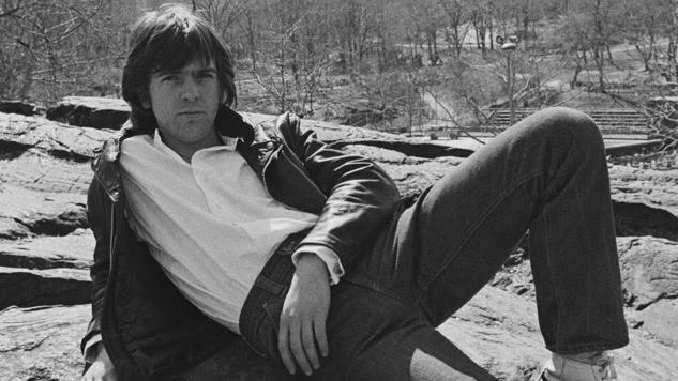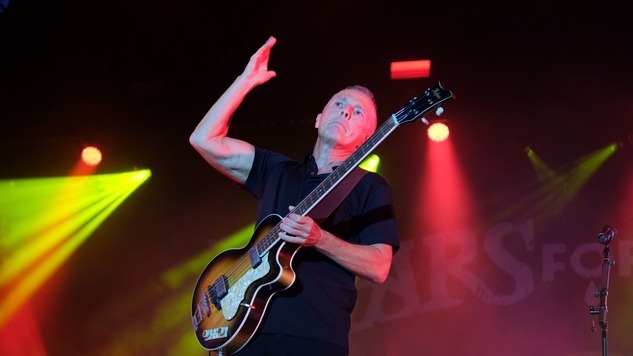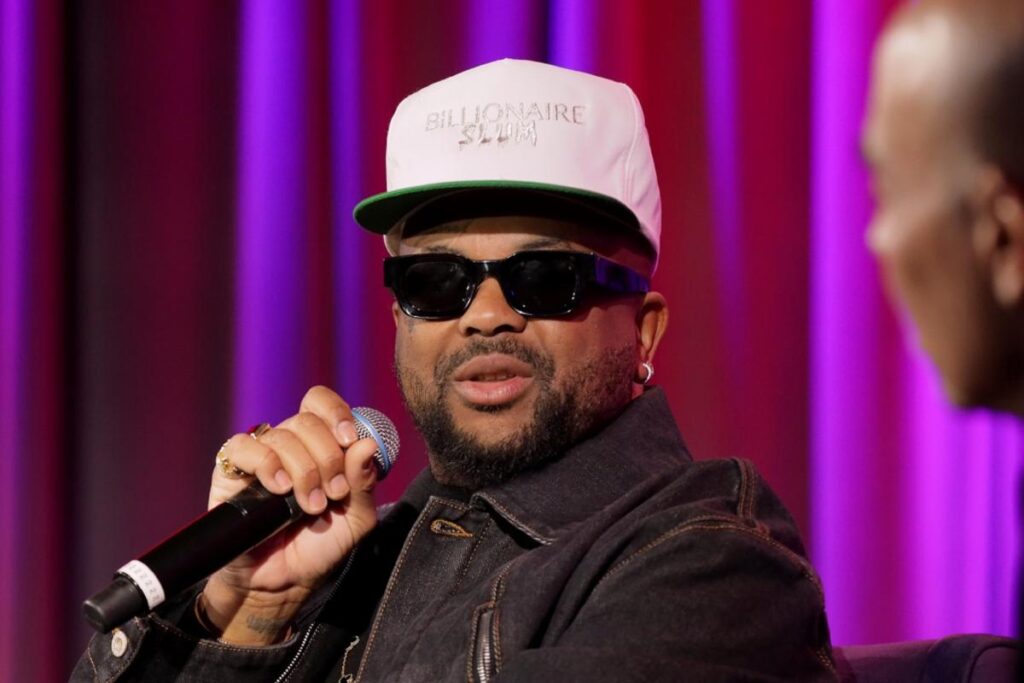When people say they’re Peter Gabriel fans, you have to wonder, “Which Peter Gabriel?” There was the showboating, high-concept Gabriel whose whimsical fairy tales made Genesis’ prog era one of the most mystifying and dazzling runs in rock history, the tender, emotional Gabriel of “In Your Eyes,” off his marvelous 1986 album So, or even the eclectic, high-minded pop Gabriel who followed. Whichever era the songwriter found himself in, he was constantly in service to his own imagination, allowing it to wander freely through different characters, sets and stories. In celebration of his talent and dedication to his craft, here’s a ranking of his top 15 solo songs.
15. “Steam”
Following the massive success of his “Sledgehammer” video (which became the most requested videos in MTV’s history), Gabriel upped the ante on his bizarre, heavily conceptual pop music. No track better embodies this era for the songwriter than “Steam,” on which it seems the songwriter was finally allowed to entertain his most vibrant and bizarre visions. The accompanying music video, directed by “Sledgehammer”’s Stephen R. Johnson, was full of incredibly strange imagery and early digital special effects, but still managed to take home the Grammy for best visual effects. Immediately ear-catching, the song’s jaunty horns, slick guitars, and driving saxophone melody are emblematic of the maximalist era in which it was made, with Gabriel’s idiosyncratic lyrics characterizing the song’s singular vision in a fun and endearing way.
14. “The Book of Love”
This choice is brought to you by the Scrubs series finale. Gabriel isn’t necessarily his best when he’s dedicating his talents to other people’s music, but his rendition of The Magnetic Fields’ “The Book Of Love” is singular and distinct, transforming the indie-pop tune into a powerful and deeply moving suite of strings and other orchestral elements for his inimitable gravelly voice, sounding at once mighty and graceful, to soar over. Released alongside his hilariously named covers album Scratch My Back, “The Book Of Love” serves as a stellar standout that only he would be able to pull off.
13. “Growing Up”
Arguably the closest Gabriel ever got to writing a Linkin Park song, “Growing Up” is an ambitious standout cut from his 2002 album Up. The ample creative energy Gabriel brought to the record revealed itself through industrial-sounding production and the most explicitly dance-oriented music of his career, best exemplified by the glitchy percussion, eerie, haunting guitars and massive beat of “Growing Up.” In some ways a return for the artist, touching on many of the noisy and ambient qualities Lamb-era Genesis explored, “Growing Up” is a late-career example of an artist whose imagination works overtime exploring a new sonic terrain.
12. “Modern Love”
A straightforward rock track from his first self-titled album, “Modern Love” is notable for marking Gabriel as a strong, capable, standalone artist and songwriter away from his work with Genesis. Immediately classic-feeling, the shredding guitars and catchy refrain recall some of the artist’s campiest but most beloved habits. There’s an old legend surrounding “Modern Love” that says Gabriel was actually taped to a high stone pillar in the recording studio because the production team felt they weren’t getting the emotion in his voice that the song needed. Judge for yourself if it worked!
11. “Shock The Monkey”
One of his biggest cult tunes, “Shock The Monkey’’ also represents one of the last times Gabriel adopted a character identity through which to perform onstage. The exact subject of the song was hotly debated, with some considering the track to have its roots in intellectual studies, but Gabriel has said publicly that it’s actually a “love song” that serves as an examination of jealousy. With its uniquely evocative instrumentation and rhythm, it’s no wonder that “Shock The Monkey” is often cited as one of his most famous and inspirational tracks.
10. “Mercy Street”
The cool rumblings that introduce “Mercy Street” build up to one of the artist’s most satisfying atmospheric soundscapes, surrounding one of the most devastating songs lyrically that Gabriel penned in the ‘80s. Quietly sensitive, the song feels like a half-forgotten memory that lingers in your head, teasing you by withholding the full story. Ultimately, like many of his songs, “Mercy Street” points to the power of imagination and embracing the inner world with the same kindness you show the outer world.
9. “Moribund the Burgermeister”
In 1974, Peter released his last album with Genesis, the masterful double album The Lamb Lies Down on Broadway, which elevated the group’s songwriting from the whimsical to the spectral, including references to demons, cannibals and whatever the hell “carpet crawlers” are. The strange, detailed imagery presented in his lyrics often caused rifts within the band, which is part of why “Moribund the Burgermeister,” the first track on Gabriel’s first solo LP, is so successful: Finally allowed total creative freedom, he manipulates his voice and dances around an eerie and unsettling instrumental that feels like an extension of some of those later Genesis ideas with a new twist. The bubbling synths that emerge after he grumbles like a bridge troll, “I will find out,” are an early indication of where the songwriter would be headed: experimentation with a bolder and ever-changing sonic landscape.
8. “Games Without Frontiers”
Gabriel’s third self-titled album found the singer both embracing and rejecting certain pop music ideals of the time. While, for the most part, its adherence to strict pop structure is debatable, on PG3 (also notated as Melt), the evolution of the artist in terms of instrumentation, i.e., synths and electronically programmed beats, is undeniable. “Games Without Frontiers,” a track meant to reframe the arbitrary politics of war as children’s games, is loaded with sounds previously alien to the artist. Light and catchy while still retaining its thematic efficacy, the track became an accidental anthem for the global unrest of the ‘80s. It was in part through this sonic experimentation that Kate Bush, who provided backing vocals on the track, came upon the Fairlight CMI synthesizer and workstation, which she would use to craft her masterpieces The Dreaming and Hounds of Love.
7. “On The Air”
“On The Air” is the best straightforward solo rock song Gabriel wrote in his early career. Recalling the high-minded grandeur of “Supper’s Ready” or “Back in NYC,” the singer again retreats into his own world of imagination to tell stories, this time exploring how freeing the radio can be as a means of self-expression. The energy Gabriel brings to the track makes it feel almost tangibly uplifting in a more authentic way than most radio-friendly stadium rock dominating the charts in the late ‘80s. Epic but accessible, the song builds to a cinematic and cathartic conclusion, full of guitars and swirling arpeggios.
6. “San Jacinto”
Built around a melodic, percussive arpeggio, “San Jacinto” is one of Gabriel’s most beautiful and dreamlike songs. There’s an ineffable quality to the artist’s work (perhaps due to his world-reaching influences) that enables his music to feel intensely cinematic in a comforting and empowering way. “San Jacinto” paints a broad sonic landscape on which Gabriel’s iconic voice thrives.
5. “In Your Eyes”
Gabriel rarely ever wrote about love as directly as he does on “In Your Eyes,” and if the song’s cultural impact is to be understood, he waited until he had something substantial to say. With its lively and euphoric melodies and dynamic instrumentation, the song is tailor-made to be a hit, and you don’t need any cheesy ‘80s movies (no disrespect) to know that.
4. “Don’t Give Up”
It’s truly a blessing that we have any collaborations between Kate Bush and Peter Gabriel. Two of that era’s finest artistic minds and most gifted, unique songwriters sharing their vision could only result in a song as gorgeous and wildly effective as “Don’t Give Up.” I’m sure I can’t be the only one carried through hard times by this song, as its bold chords introduce Bush’s iconic and reassuring voice amidst Gabriel’s storytelling. Elements like longtime collaborator Tony Levin’s bass and Manu Katche’s percussion work add layers of expression and motion to this highly emotive piece. “Don’t Give Up” captures the combination of ideas and intense feeling that made So such a landmark album.
3. “Biko”
Gabriel’s music came with a mission: He wanted the listener to look outside what was immediately available to them and to gaze into new worlds, both real and imaginary, both lovely and terrible. He was, and remains, a huge voice for the globalization of music and the calling out of atrocities happening around the globe, in a non-”We Are The World,” commercial way. Inspired by the death of anti-apartheid activist Steve Biko, this song’s lyrics convey his story and his struggle, including phrases in Xhosa and recordings of songs sung at Biko’s funeral. Gorgeous and haunting, its simple beat mixed with guitar, Gabriel’s soaring voice and a distorted bagpipe make the track feel expansive enough to meet the occasion.
2. “Sledgehammer”
1986 was a good year to be Peter Gabriel. A bigger name than he’d ever been, with more financial resources to support the immense vision he’d explored for almost two decades, he unleashed his greatest commercial and musical success, the landmark album So, which has now gone 5x platinum and featured chart-topping hit after hit. “Sledgehammer,” one of the biggest names from the album in part due to its aforementioned video, is among one of Gabriel’s finest pop songs, with an unbeatable chorus, unique instrumentation (the flute that leads the track in was a simply inspired decision) and production that makes the track feel as though it’s hitting as hard as its namesake. There’s no wonder why, 30+ years after its release, mainstream pop stars like Harry Styles are still covering “Sledgehammer”—as he says in the song, “feel that [power] coming through.”
1. “Solsbury Hill”
“Solsbury Hill” is basically a perfect song. There’s practically no way to not be swayed by its intensely charming melody and instrumentation. Released two years after Gabriel publicly left Genesis, it was his first solo single, and would go on to define the rest of his career. With lyrics recalling divine intervention in the form of a mystical encounter, Gabriel has said that the song is about “letting go” and “moving on,” a revelation that perhaps freed the artist to write decades of incredible, imaginative music.
Jason Friedman is a Paste editorial music intern located in Philadelphia and they’re a little afraid of ghosts.




